Related Research Articles
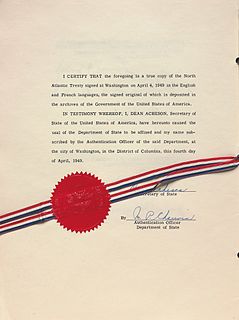
The North Atlantic Treaty, also referred to as the Washington Treaty, is the treaty that forms the legal basis of, and is implemented by, the North Atlantic Treaty Organization (NATO). The treaty was signed in Washington, D.C. on 4 April 1949.
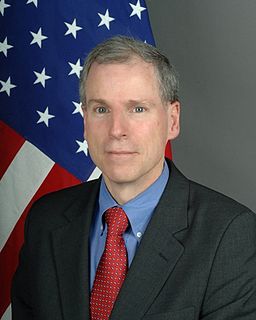
Robert Stephen Ford is a retired American diplomat who served as the United States Ambassador to Algeria from 2006 to 2008 and the United States Ambassador to Syria from 2010 to 2014.
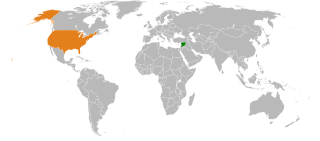
Diplomatic relations between Syria and the United States are currently non-existent; they were suspended in 2012 after the onset of the Syrian Civil War. Priority issues between the two states include the Arab–Israeli conflict, the Golan Heights annexation, and the Iraq War.

The Embassy of Syria in Washington, D.C. is the suspended diplomatic mission of the Syrian Arab Republic to the United States. The final ambassador of the Syrian Arab Republic was Imad Moustapha. A Charge D'Affaires has not been named.

Iraq–Syria relations are marked by long-shared cultural and political links, as well as former regional rivalry. The two countries took their present form after the Sykes–Picot Agreement to dismember the Ottoman Empire into British and French spheres of influence after World War I.
International reactions to the Syrian Civil War ranged from support for the government to calls for the government to dissolve. The Arab league, United Nations and Western governments in 2011 quickly condemned the Syrian government's response to the protests which later evolved into the Syrian Civil War as overly heavy-handed and violent. Many Middle Eastern governments initially expressed support for the government and its "security measures", but as the death toll mounted, especially in Hama, they switched to a more balanced approach, criticizing violence from both government and protesters. Russia and China vetoed two attempts at United Nations Security Council sanctions against the Syrian government.

The Siege of Hama (2011) was among the nationwide crackdowns by the Syrian Government during the early stage of the Syrian Civil War. Anti-government protests had been ongoing in the Syrian city of Hama since 15 March 2011, when large protests were first reported in the city, similar to the protests elsewhere in Syria as part of the wider Syrian Civil War. The events beginning in July 2011, were described by anti-government activists in the city as a "siege" or "blockade".
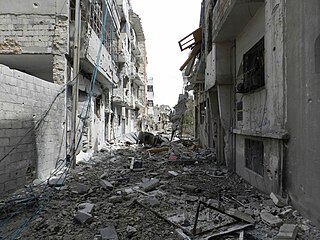
The 2012 Homs offensive was a Syrian Army offensive on the armed rebellion stronghold of Homs, within the scope of the Siege of Homs, beginning in early February 2012 and ending with the U.N. brokered cease fire on April 14, 2012.

Russia has supported the internationally recognised government of Syria since the beginning of the Syrian conflict in 2011: politically, with military aid, and since 30 September 2015 also through direct military involvement. The latter marked the first time since the end of the Cold War that Russia entered an armed conflict outside the borders of the former Soviet Union.

The United Nations Supervision Mission in Syria (UNSMIS) is a United Nations peacekeeping mission in Syria, set up in 2012 as a result of United Nations Security Council Resolution 2043 in response to the Syrian Civil War. It was commanded by Norwegian major general Robert Mood until 20 July 2012 followed by Lieutenant General Babacar Gaye from Senegal. Although observers remain in the country, Mood suspended their mission on June 16, 2012 citing "escalating violence." Observers will conduct no further patrols and stay in their current positions until the suspension is lifted. On 20 July 2012, the Security Council extended UNSMIS for a final period of 30 days. According to resolution 2059, the Council would only consider more extensions in the event that the Secretary-General reports and the Security Council confirms the cessation of the use of heavy weapons and a reduction in the level of violence sufficient by all sides to allow UNSMIS to implement its mandate.

The Geneva II Conference on Syria was a United Nations-backed international peace conference on the future of Syria with the aim of ending the Syrian Civil War, by bringing together the Syrian government and the Syrian opposition to discuss the clear steps towards a transitional government for Syria with full executive powers. The conference took place on 22 January 2014 in Montreux, on 23–31 January 2014 in Geneva (Switzerland), and again on 10–15 February 2014.
The Khan al-Assal chemical attack was a chemical attack in Khan al-Assal, Aleppo, Syria on 19 March 2013, which according to the Syrian Observatory for Human Rights resulted in at least 26 fatalities including 16 government soldiers and 10 civilians, and more than 86 injuries. Immediately after the incident, the Syrian government and opposition accused each other of carrying out the attack, but neither side presented clear documentation. The Syrian government asked the United Nations to investigate the incident, but disputes over the scope of that investigation led to lengthy delays. In the interim, the Syrian government invited Russia to send specialists to investigate the incident. Samples taken at the site led them to conclude that the attack involved the use of sarin, which matched the assessment made by the United States. Russia held the opposition responsible for the attack, while the US held the government responsible. UN investigators finally arrived on the ground in Syria in August, but their arrival coincided with the much larger-scale 2013 Ghouta attacks which took place on 21 August, pushing the Khan al-Assal investigation "onto the backburner" according to a UN spokesman. The UN report, which was completed on 12 December, found "likely use of chemical weapons in Khan al-Assal" and assessed that organophosphate poisoning was the cause of the "mass intoxication".
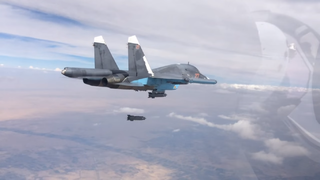
The Russian military intervention in the Syrian Civil War began in September 2015, after an official request by the Syrian government for military aid against rebel groups. The intervention initially consisted of air strikes fired by Russian aircraft stationed in the Khmeimim base at targets primarily in north-western Syria, against Syrian opposition militant groups opposed to the Syrian government, including the Syrian National Coalition, the Islamic State of Iraq and the Levant (ISIL), al-Nusra Front and the Army of Conquest. In addition, Russian special operations forces and military advisors were stationed in Syria. Prior to the intervention, Russian involvement in the Syrian Civil War had mainly consisted of supplying the Syrian Army with arms and equipment. At the end of December 2017, the Russian government said its troops would be based in Syria permanently.

The Russia–Syria–Iran–Iraq coalition, also referred to as 4+1, is a joint intelligence-sharing cooperation between opponents of the Islamic State of Iraq and the Levant (ISIL) with operation rooms in Syria's Damascus and Iraq's Green Zone in Baghdad. It was formed as a consequence of an agreement reached at the end of September 2015 between Russia, the Islamic Republic of Iran, Iraq and the Syrian Arab Republic to "help and cooperate in collecting information about the terrorist Daesh group" (ISIL) with a view to combatting the advances of the group, according to the statement issued by the Iraqi Joint Operations Command. The statement also cited "the increasing concern from Russia about thousands of Russian terrorists committing criminal acts within ISIS."

A Turkish Air Force F-16 fighter jet shot down a Russian Sukhoi Su-24M attack aircraft near the Syria–Turkey border on 24 November 2015. According to Turkey, the aircraft—whose nationality was unknown at the time—was fired upon while in Turkish airspace because it violated the border up to a depth of 2.19 kilometres for about 17 seconds after being warned to change its heading 10 times over a period of five minutes before entering the airspace. The Russia Defence Ministry denied the aircraft ever left Syrian airspace, counter-claiming that their satellite data showed that the Sukhoi was about 1,000 metres (1,100 yd) inside Syrian airspace when it was shot down. The U.S. State Department said that the U.S. independently confirmed that the aircraft's flight path violated Turkish territory, and that the Turks gave multiple warnings to the pilot, to which they received no response and released audio recordings of the warnings they had broadcast. Turkish President Recep Tayyip Erdogan pointed out that Turkey had the right to defend its airspace. Russian president Vladimir Putin said that the U.S. knew the flight path of the Russian jet and should have informed Turkey; two U.S. officials said that Russia did not inform the U.S. military of its jet's flight plan.

The Geneva peace talks on Syria, also known as Geneva III, are intended peace negotiations between the Syrian government and opposition in Geneva under the auspices of the UN. Although formally started on 1 February 2016, they were formally suspended only two days later, on 3 February 2016.
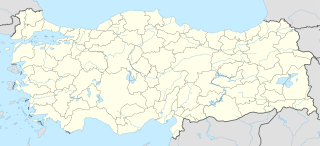
Andrei Karlov, the Russian Ambassador to Turkey, was assassinated by Mevlüt Mert Altıntaş, an off-duty Turkish police officer, at an art exhibition in Ankara, Turkey on the evening of 19 December 2016. The assassination took place after several days of protests in Turkey over Russian involvement in the Syrian Civil War and the battle over Aleppo.

Andrei Gennadyevich Karlov was a Russian diplomat who served as the Russian Ambassador to Turkey and earlier as the nation's ambassador to North Korea.

On the morning of 7 April 2017, the United States launched 59 Tomahawk cruise missiles from the Mediterranean Sea into Syria, aimed at Shayrat Airbase controlled by the Syrian government. The strike was executed under responsibility of U.S. President Donald Trump, as a direct response to the Khan Shaykhun chemical attack that occurred on 4 April.
Abkhazia–Syria relations refers to the bilateral relationship between the Republic of Abkhazia and Syria. Syria recognised Abkhazia on 29 May 2018. The establishment of relations on an embassy-level were announced.
References
- ↑ Список руководителей дипломатических и консульских представительств зарубежных государств в России (in Russian). Ministry of Foreign Affairs (Russia) . Retrieved 2008-07-05.
| This Syrian diplomat-related article is a stub. You can help Wikipedia by expanding it. |